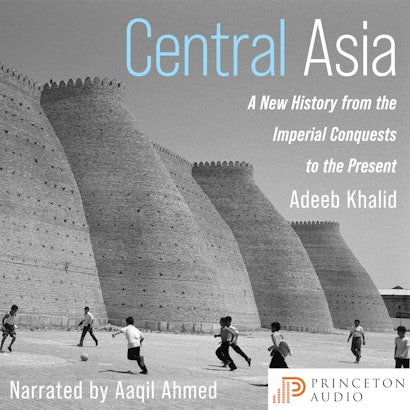Central Asia is often seen as a remote and inaccessible land on the peripheries of modern history. Encompassing Uzbekistan, Tajikistan, Turkmenistan, Kyrgyzstan, Kazakhstan, and the Xinjiang province of China, it in fact stands at the crossroads of world events. Adeeb Khalid provides the first comprehensive history of Central Asia from the mid-eighteenth century to today, shedding light on the historical forces that have shaped the region under imperial and Communist rule.
Predominantly Muslim with both nomadic and settled populations, the peoples of Central Asia came under Russian and Chinese rule after the 1700s. Khalid shows how foreign conquest knit Central Asians into global exchanges of goods and ideas and forged greater connections to the wider world. He explores how the Qing and Tsarist empires dealt with ethnic heterogeneity, and compares Soviet and Chinese Communist attempts at managing national and cultural difference. He highlights the deep interconnections between the “Russian” and “Chinese” parts of Central Asia that endure to this day, and demonstrates how Xinjiang remains an integral part of Central Asia despite its fraught and traumatic relationship with contemporary China.
The essential history of one of the most diverse and culturally vibrant regions on the planet, this panoramic book reveals how Central Asia has been profoundly shaped by the forces of modernity, from colonialism and social revolution to nationalism, state-led modernization, and social engineering.
Adeeb Khalid is the Jane and Raphael Bernstein Professor of Asian Studies and History at Carleton College. His books include Making Uzbekistan: Nation, Empire, and Revolution in the Early USSR and Islam after Communism: Religion and Politics in Central Asia. Aaqil Ahmed is an award-winning broadcaster and director of Amplify Consulting Ltd., a company specializing in media production, diversity advice, and communications.
"A stunning achievement. Combining his own deep knowledge of Central Asia with the most recent scholarship, Khalid gives us an unrivalled modern history of the region as an integrated whole. This accessible and empathetic book marks an important step forward in linking Central Asia to the wider global history of colonialism and its afterlives."—David Brophy, author of Uyghur Nation: Reform and Revolution on the Russia-China Frontier
"A masterful work. Adeeb Khalid draws together the legacies of the Russian and Chinese imperial conquests of Central Asia to provide a comprehensive and compelling understanding of the region's political, cultural, and social transformations."—Marianne Kamp, author of The New Woman in Uzbekistan: Islam, Modernity, and Unveiling under Communism
"A remarkable achievement. Khalid does an exceptional job at presenting a balanced, insightful, and accessible treatment of Central Asian history and analyzing the contingencies that led it to unfold the way it did. This is history writing at its best."—Scott C. Levi, author of The Bukharan Crisis and The Rise and Fall of Khoqand, 1709–1876
"A superb work of scholarship that skillfully weaves together more than two decades of research on modern Central Asia."—Michael A. Reynolds, author of Shattering Empires: The Clash and Collapse of the Ottoman and Russian Empires, 1908–1918
"Sophisticated but accessible, this book offers a long-overdue corrective to the division of Central Asia's history into east and west. Khalid shows how the two zones' fates have not just run parallel but have been intertwined, both despite and because of their colonization by China and Russia."—Rian Thum, author of The Sacred Routes of Uyghur History

